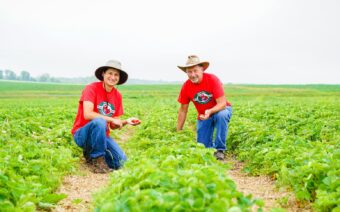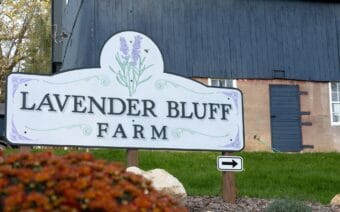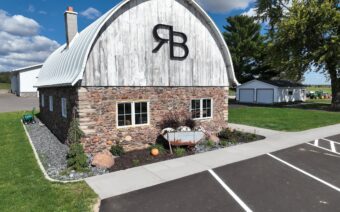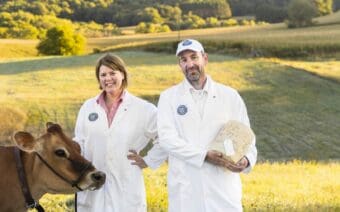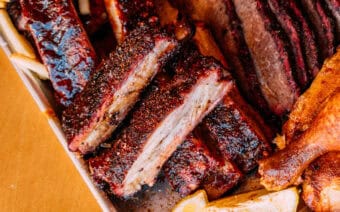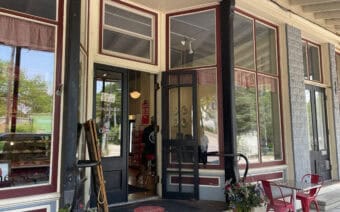
November 25, 2024
VIROQUA – When rotational grazing gained popularity in the early 2010s, Reed Doerr – president of Shade Haven – said nearly every aspect of the process was taken into consideration, except for one.
“Rotational grazing is basically a way of farming that allows farmers to actually increase the number of cattle they have on their land, while at the same time getting better forages – you get your stock and density higher, but you can also get more out of your pasture,” he said.
Reed said this is done by condensing the animals down into small paddocks and then moving them multiple times a day.
“This is a very easy process when you have the systems set up to do so,” he said. “Those systems are primarily an electric fence – a single wire of electric fence that you can turn on and off real quickly and move and put a fence post in with your foot – and then you need water. You need to be able to provide water to these animals in all these different little, tiny paddocks.”
Another important aspect, Reed said, that was overlooked was shade.
“You’d have a beautiful 100-acre pasture that might have been an old cornfield, or something like that, that’s now grass and around the edge you might have some trees, or you might have some coverage for shade,” he said. “But inevitably, you’re out in the middle of what is now a pasture – it’s going to be the middle of July, it’s going to be 95 degrees and 100% humidity and you’ve effectively taken your 50-75 animals and stuck them in really miserable conditions.”
The rotational grazing process, Reed said, works – but farmers needed some type of shade device that could mimic a tree in the pastures, that was also easy to move.

“The electric fences can be set up by the farmer in minutes,” he said. “The water tanks – thanks to modern technology – have quick connects and float valves, therefore always staying full. We needed some type of shade device that could be moved as simply as the rest of the equipment.”
That, Reed said, is where Shade Haven comes in.
Circle of life
The increased popularity of rotational grazing, Reed said, has a great deal to do with people paying more attention to the quality of their food.
“Not only does the quality of food make a difference for us, as consumers, but the quality of food tends to also have an impact on our land,” he said. “Grass farming, for instance, is a way of farming that doesn’t disturb the soil as much. It has long, wide, reaching benefits from producing good quality food to combating global warming and climate change with carbon sequestration – which is a way that carbon can get sent into the ground with the roots of these grasses.”
The microbial activity that takes place in grass farming, Reed said, is a relationship between the grass and forages, the hooves of cattle and then the microbial bacteria that is in their manure – “it turns it into nutrients for the grass to grow.”
“It’s kind of a Lion King circle of life thing,” he said.
Shade Haven products, Reed said, have played a part in many farmers’ efforts to promote their sustainable farming techniques and its focus on quality products.
“The shades become sort of a picture of their farm – serving as a representation of who they are and what they believe in,” he said. “You don’t need to have a lot of education or knowledge about farming to look out in a pasture and see a bunch of cows standing under a shade, to make you think, ‘Oh, wow, that farmer really thought about something and cares about their animals.’”
Ideation to creation to market
The Shade Haven idea itself, Reed said, was sparked by the out-of-the-box thinking of Vince Hundt – a “progressive farmer who farmed his whole life outside of La Crosse.”
“Throughout his entire life, he has always been on that kind of cutting edge of farming,” he said.
This, Reed said, included the implementation of rotational grazing.
However, after watching his animals suffer in the hot summer sun on his pastured dairy operation, Reed said Hundt – a long-time dairy farmer, heavy equipment inventor and salesman – knew there was a better way to keep his animals comfortable and productive.
However, when he went to the market looking for a solution, Reed said Hundt wasn’t able to find something that was large or sturdy enough to support his whole herd.
It was then, Reed said, that Hundt decided he would build something himself.
Hundt’s goal, Reed said, was to make a structural piece of equipment that’s like a building that a farmer can move 100 feet, twice a day in 15 minutes.
“It had to be small enough and easy enough for a farmer to move it, but it’s got to be durable enough and heavy enough that Mother Nature’s wind doesn’t move it,” Reed said. “That was the problem that Shade Haven set out to solve.”
Partnering with Guthrie Knapp and Peter Bergquist, who had degrees in architectural studies and civil engineering, respectively, Shade Haven was born – developing the first product in summer 2012.
“Through trial and error and development, we came up with the system and created a patent for it,” Reed said. “It is a deployer that allows it to open and close in this sort of circular manner. It’s kind of built off of the same concept as those Chinese fans. It’s a very simple concept to quickly open up a large surface and then fold it back up.”
After the successful prototype was tested on the farm, Reed said some changes were made to the design before bringing it to market – with the first sales coming in early 2013.
Reed said when he joined the company in 2013 his first main role was getting the business “out of the garage.”

“It started in Hundt’s garage,” he said. “The idea was, I’ll build the first one, and then see how it works. And when it worked, it was then, ‘Hey, let’s, let’s make a business out of this.’ So my first role was basically to move out of the garage and set up a manufacturing facility in rural Wisconsin – which, (is) what we did.”
The next 10-plus years, Reed said, were spent “promoting it, showing it and sharing it.”
Today, he said Shade Haven mobile shade structures can be found throughout the U.S. and internationally on grazing dairy and beef farms and other diversified livestock farms.
“We have more than 500 of them out in pastures around the world,” he said. “We have a dealer in Europe. We have a dealer in Canada, and we have them as far away as Dubai. We’ve shipped them all over the world, but the majority of them are here in the United States.”
Since moving out of Hundt’s garage, Reed said Shade Haven has moved two other times in the last nearly 10 years.
“That first facility was a good facility, but we rented it,” he said. “We weren’t in a position where we were able to buy at that time, so we were, to some degree, at the mercy of the market and what the landlord decided to do with the building. He ultimately decided to sell, which meant we had to leave.”
After spending a couple of years at another location, Reed said the decision was made for Shade Haven to build its own facility (1225 Railroad Ave.).
“January of 2023 is when we first moved into it,” he said. “So, we’re fortunate to now have control over where we are,” he said.
The company, Reed said, has also grown in employees.
“We are seven strong now,” he said. “We’re a fairly small team, so we all wear a lot of hats. We work very closely from the bottom to the top in terms of what needs to get done. I technically sit in that top role, however, I find myself out in the shop helping the shop techs and shop manager. Sometimes, I even help them put a shade together in the summertime if we get busy.”
Planting a seed
In Shade Haven’s first few years, Reed said, he often felt like one of those people dressed as a pizza dancing on the corner encouraging customers to visit the restaurant.
“It was a lot of just trying to create brand recognition,” he said. “We wanted to share that it was a viable solution, that folks could trust us as a young company, that our products were reputable and the quality of our products was good – that was a really long slog, if you will. It took a lot of effort and personal energy.”
Recognizing that people are often leery of a new company – asking questions such as will they stand behind their products? What happens if it breaks? – Reed said the Shade Haven team had to work hard to build trust with customers.
“Building that reputation and building that brand was a real challenge,” he said. “I say challenge in a good way, in the sense that we worked real hard at it.”
Now – “and I don’t want to sound presumptuous” – Reed said, Shade Haven products often find themselves on the Christmas lists of farmers.
“People now understand the importance of shade,” he said. “The problem is figuring out how to budget for it – as we know, farmers are perpetually underfunded. It’s a labor of love to be a farmer. There’s always needs, and there’s always a cash shortage, so adding a new piece of equipment is always something that takes a lot of planning for farmers.”
Going from the “standing at a stoplight in a pizza costume” stage to having a reputable, known brand in the market, Reed said, is pretty humbling.
Cream of the crop
Being located in West Central Wisconsin, Reed said, has many benefits.
“As I traveled around and lived in other states, I learned that there’s two real special things that are dear to us as Wisconsinites – manufacturing and agriculture,” he said. “Farming has taken a real hit in this country and taken a real hit in our state. So I think having something that sort of connects those and kind of brings it back to Wisconsin is positive.”
Doing business throughout the country and abroad, Reed said, makes Wisconsin an ideal homebase for Shade Haven.
“Wisconsin is in the middle of the country,” he said. “We ship these things all over the place and shipping is a major major part of the conversation in the sale, because it costs quite a bit to ship these things. So being centrally located is a strategic advantage.”
Fanning out
Shade Haven’s flagship product, Reed said, is its SH1200 – which as the name suggests, covers 1,200 square feet of pasture.
“That’s the product we sell the most of,” he said.
Shade Haven’s smaller model – the SH600 – covers 600 square feet and, Reed said, is geared toward hobby farmers.
“They’re not necessarily getting all their revenue and income off their farm,” he said. “They may have a small herd of cattle, and they care a lot about their animals, but they weren’t necessarily able to justify getting our large model. So, we developed that smaller model.”
In recent years, Reed said Shade Haven has branched out from focusing just on agricultural shades to shades for people.
“We have developed what we call an SH1200p and a SH600p, which are a people model,” he said. “That’s becoming a major part of our business, and probably our future – we see the application is far larger in the places that it can be used.”
The idea for Shade Haven’s people model, Reed said, was sparked at a trade show.

“We were at an agriculture trade show, it’s hot and at lunchtime, everyone was kind of wondering where to sit down,” he said. “We had a bunch of hay bales set out under a Shade Haven, and people would sit under it.”
That, Reed said, was an “aha moment.”
“We thought, ‘wow, this thing would work really well for barbecues or graduation parties or music festivals,” he said.
Though farming, Reed said, “is certainly where our hearts lie and where we started” – at the same time, from an economic perspective, a mobile shade for people has a larger window of opportunity.
“Our people side is something that we’re very excited about,” he said. “Our event shade is something that, in the last year, we’ve invested a lot of resources into and we’re very optimistic about.”
Reed said Shade Haven sees this year as a turning point regarding sales.
“We see our 90% agriculture and 10% people split quickly changing,” he said.
In addition to state fairs, parties and festivals, Reed said Shade Haven sees an opportunity for high school sports.
“There’s water, but there’s often no shade available in these sports complexes,” he said. “So having something that you can quickly set up and move that’s not a permanent structure, I think, there’s a very large application for that. We’re very excited to see what we can do and see if we can expand our business and bring that to the world as well.”
 Homeschooling parents open The Homie Hub in Oshkosh
Homeschooling parents open The Homie Hub in Oshkosh Feeding customers in a relaxed setting for 90 years
Feeding customers in a relaxed setting for 90 years


